Praise songs from a hymn perspective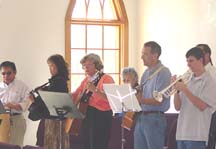
An old farmer went to the city one weekend and attended a big city church. He came home and his wife asked him how it was. "Well," said the farmer, "It was good. They did something different, however. They sang praise choruses instead of hymns."
"Praise choruses?" said his wife. "What are those?"
"They're sort of like hymns, only different," said the farmer.
"What's the difference?" asked the wife.
The farmer said, "Well, if I said, 'Martha, the cows are in the corn,' that
would be a hymn. But if I said, 'Martha, Martha, Martha, Oh Martha, MARTHA, MARTHA, the cows, the big cows, the brown cows, the black cows, the white cows, the black and white cows, the COWS, COWS, COWS, are in the corn, are in the corn, are in the corn, are in the corn,' that would be a praise chorus."
Hymns from a praise perspective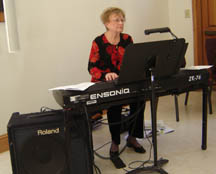
A young Christian went to his local church usually, but one weekend attended a small-town church. He came home and his wife asked him how it was.
"Well," said the young man, "It was good. They did something different, however. They sang hymns instead of regular songs."
"Hymns," said his wife, "What are those?"
"Oh, they're okay. They're sort of like regular songs, only different," said the young man.
"Well, what's the difference?" asked his wife.
The young man said, "Well it's like this: If I were to say to you, 'Martha, the cows are in the corn,' well that would be a regular song. If, on the other hand, I were to say to you:
Oh Martha, dear Martha, hear thou my cry.
Inclinest thine ear to the words of my mouth.
Turn thou thy whole wondrous ear by and by,
To the righteous, inimitable, glorious truth.
For the way of the animals who can explain?
There in their heads is no shadow of sense.
Hearkenest they in God's sun or His rain,
Unless from the mild, tempting corn they are fenced.
Yea, those cows in glad bovine, rebellious delight,
Have broke free their shackles, their warm pens eschewed.
Then goaded by minions of darkness and night
They all my mild Chilliwack sweet corn have chewed.
So look to that bright shining day by and by,
Where all foul corruptions of earth are reborn.
Where no vicious animal makes my soul cry
And I no longer see those foul cows in the corn.
"Then, if I were to do only verses one, three and four and do a key change on the last verse, well that would be a hymn."
—from an anonymously circulating email.
 Perhaps it is a matter of priorities as the first survey also found that 51% percent of Americans place their highest priority on family with just 16% making faith that top priority. It is understandable that many would make that choice. I place a high priority on my family as well. By the way, the other priorities were: health (7%), lifestyle (5%), vocational matters (3%), money (3%), achieving success (3%), friendships (1%), leisure pursuits (1%), and having influence (1%). But scripture tells us that God must come first, and that this will help create a better family. So the two do not have to be mutually exclusive.
Perhaps it is a matter of priorities as the first survey also found that 51% percent of Americans place their highest priority on family with just 16% making faith that top priority. It is understandable that many would make that choice. I place a high priority on my family as well. By the way, the other priorities were: health (7%), lifestyle (5%), vocational matters (3%), money (3%), achieving success (3%), friendships (1%), leisure pursuits (1%), and having influence (1%). But scripture tells us that God must come first, and that this will help create a better family. So the two do not have to be mutually exclusive. Dazzling darkness is just the sort of paradox writers of the middle ages and previous often used to describe how the deep and hidden things of God can break into our lesser understanding of God. In the Exodus account, we are told of Moses entering a cloud to experience God more deeply. Solomon asserted that God has said he will live in deep darkness. Alongside the imagery of God as light, we also find scripture that speaks of darkness. We learn from this darkness imagery primarily that God is God and we are not. God’s thoughts are not our thoughts, God’s ways are not our ways.
Dazzling darkness is just the sort of paradox writers of the middle ages and previous often used to describe how the deep and hidden things of God can break into our lesser understanding of God. In the Exodus account, we are told of Moses entering a cloud to experience God more deeply. Solomon asserted that God has said he will live in deep darkness. Alongside the imagery of God as light, we also find scripture that speaks of darkness. We learn from this darkness imagery primarily that God is God and we are not. God’s thoughts are not our thoughts, God’s ways are not our ways. 

 The mandatory part of the commandment implied is that we stand up for others and vindicate them when they are injured by lying lips. This is the sense of the commandment, not only that we should not slander falsely or accuse others; but that we should witness for them, and stand up in their defence, when we know them to be traduced.
The mandatory part of the commandment implied is that we stand up for others and vindicate them when they are injured by lying lips. This is the sense of the commandment, not only that we should not slander falsely or accuse others; but that we should witness for them, and stand up in their defence, when we know them to be traduced. 


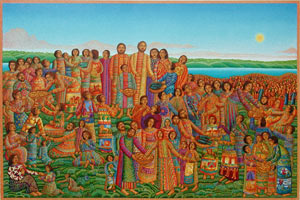 Jesus IS with us. We must remember that it is the presence of Christ that makes possible anything we may be able to accomplish. We come bringing our meager resources, our meager selves, saying, along with Andrew, "But what is this when the need is so great?" And Jesus takes what we offer and somehow it becomes enough—not just barely enough, but overflowing—just as the fragments of leftover loaves and fishes overflowed and filled twelve baskets. Our offering is transformed—and so are we, because now God can use us to make a difference in the world.
Jesus IS with us. We must remember that it is the presence of Christ that makes possible anything we may be able to accomplish. We come bringing our meager resources, our meager selves, saying, along with Andrew, "But what is this when the need is so great?" And Jesus takes what we offer and somehow it becomes enough—not just barely enough, but overflowing—just as the fragments of leftover loaves and fishes overflowed and filled twelve baskets. Our offering is transformed—and so are we, because now God can use us to make a difference in the world.  The only choice we have is to reconcile ourselves to our own flaws and the flaws in other people, or withdraw both from our humanness and our connection to the sacred....
The only choice we have is to reconcile ourselves to our own flaws and the flaws in other people, or withdraw both from our humanness and our connection to the sacred.... Now I know that I do not have the potential, in this life, for perfection. I am human, therefore imperfect. So the standard against which I need to measure myself is most certainly not God—we know that God IS perfect. The standard against which I should measure myself is, at best, my potential for excellence but never perfection. We all have the potential for excellence. It is when we think we can be perfect that we get into trouble.
Now I know that I do not have the potential, in this life, for perfection. I am human, therefore imperfect. So the standard against which I need to measure myself is most certainly not God—we know that God IS perfect. The standard against which I should measure myself is, at best, my potential for excellence but never perfection. We all have the potential for excellence. It is when we think we can be perfect that we get into trouble. An old farmer went to the city one weekend and attended a big city church. He came home and his wife asked him how it was. "Well," said the farmer, "It was good. They did something different, however. They sang praise choruses instead of hymns."
An old farmer went to the city one weekend and attended a big city church. He came home and his wife asked him how it was. "Well," said the farmer, "It was good. They did something different, however. They sang praise choruses instead of hymns." A young Christian went to his local church usually, but one weekend attended a small-town church. He came home and his wife asked him how it was.
A young Christian went to his local church usually, but one weekend attended a small-town church. He came home and his wife asked him how it was.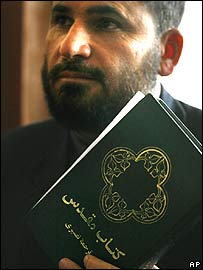
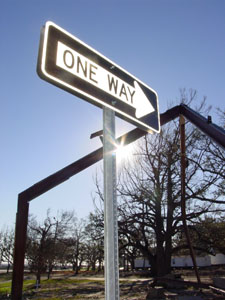

 "In the reality which I have and am now, there is a possibility for growth which God has put there. There's a seed God has planted there and is going to make grow, and what I have to provide is the love and assent that's going to permit it to grow."
"In the reality which I have and am now, there is a possibility for growth which God has put there. There's a seed God has planted there and is going to make grow, and what I have to provide is the love and assent that's going to permit it to grow."

 In
In 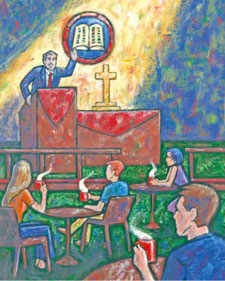 I don't think that our current practice crosses over into making our house of prayer into a marketplace. But it is always worth considering our actions in the light of the Gospel. What do you think? Have we gone to far? What about churches that have a Starbucks in the lobby? I once bought a Starbucks coffee in the lobby of Chicago's
I don't think that our current practice crosses over into making our house of prayer into a marketplace. But it is always worth considering our actions in the light of the Gospel. What do you think? Have we gone to far? What about churches that have a Starbucks in the lobby? I once bought a Starbucks coffee in the lobby of Chicago's 
 Recently I walked the grounds at Shaker Village. The simplicity and beauty of the architecture ministered to me deeply. Seeing the shapes and lines of Shaker design gave me the strong impression that the beauty we carve from and into is ultimately of God's design. Therefore the key is not to make the world reflect ornate busyness, but to reflect God's goodness. How do we do that? By creating God's handiwork whenever we invite the Lord to dwell in us. We share in God's abundant grace when we foster encouragement of our own faith lives and those around us. Lent is about making space and time to be with the very same One who created all of the world's most extravagent beauty. You too are beautiful and I pray that God's light continually shines on, in, and through you.
Recently I walked the grounds at Shaker Village. The simplicity and beauty of the architecture ministered to me deeply. Seeing the shapes and lines of Shaker design gave me the strong impression that the beauty we carve from and into is ultimately of God's design. Therefore the key is not to make the world reflect ornate busyness, but to reflect God's goodness. How do we do that? By creating God's handiwork whenever we invite the Lord to dwell in us. We share in God's abundant grace when we foster encouragement of our own faith lives and those around us. Lent is about making space and time to be with the very same One who created all of the world's most extravagent beauty. You too are beautiful and I pray that God's light continually shines on, in, and through you.

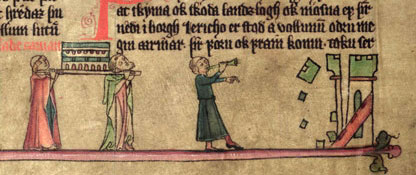
 We can approach our faith as if it is all about self actualization—helping you to be the best you that you can be. Or we can approach faith as something to meet our needs and see ourselves as consumers of church and so seek out a church that meets our needs. There are many similar ways we can approach our faith. But Jesus challenges those who would follow him to die to themselves in order to live to God. As Daniel Berrigan put it, "If you want to follow Jesus, you better look good on wood."
We can approach our faith as if it is all about self actualization—helping you to be the best you that you can be. Or we can approach faith as something to meet our needs and see ourselves as consumers of church and so seek out a church that meets our needs. There are many similar ways we can approach our faith. But Jesus challenges those who would follow him to die to themselves in order to live to God. As Daniel Berrigan put it, "If you want to follow Jesus, you better look good on wood."
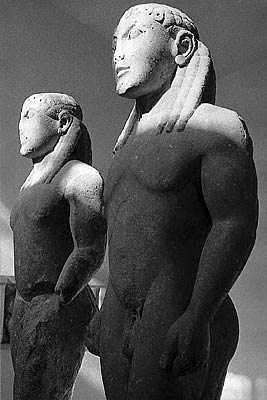


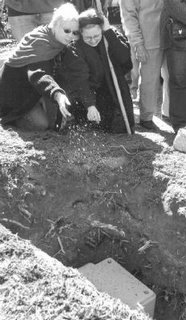
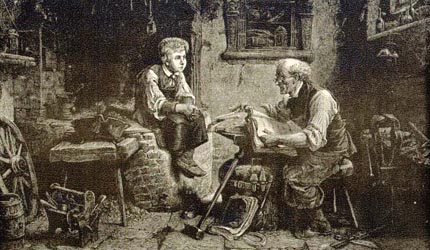
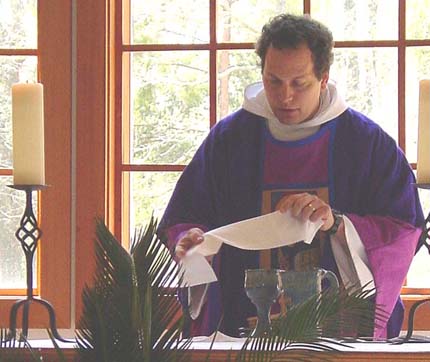
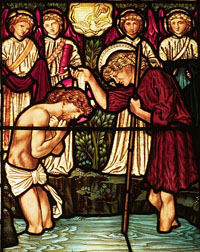 In the
In the  Today, in the Episcopal calendar of saints, we remember John and Charles Wesley, brothers whose ministry included time surving in our own Diocese of Georgia. While the movement they started within the Church of England may have grown into a separate denomination, the two remained Anglicans their whole lives (even if taking actions that made the division likely). The movement they started became known as Methodists when there were still but a handful in the group. At Oxford College they were given this name as a term of derision from a student who, according to John, did so "in allusion to the ancient sect of Physicians so called, from their teaching, that almost all diseases might be cured by a specific method of diet and exercise, or from their observing a more regular method of study and behaviour than was usual with those of their age and station."
Today, in the Episcopal calendar of saints, we remember John and Charles Wesley, brothers whose ministry included time surving in our own Diocese of Georgia. While the movement they started within the Church of England may have grown into a separate denomination, the two remained Anglicans their whole lives (even if taking actions that made the division likely). The movement they started became known as Methodists when there were still but a handful in the group. At Oxford College they were given this name as a term of derision from a student who, according to John, did so "in allusion to the ancient sect of Physicians so called, from their teaching, that almost all diseases might be cured by a specific method of diet and exercise, or from their observing a more regular method of study and behaviour than was usual with those of their age and station."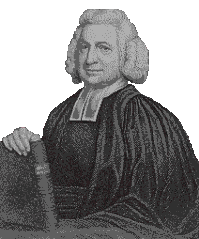 Their Method of being strict in observing the worship of the Book of Common Prayer took off and in time became a thriving denomination of its own. When it was still a movement within the Anglican Church, John Wesley wrote out
Their Method of being strict in observing the worship of the Book of Common Prayer took off and in time became a thriving denomination of its own. When it was still a movement within the Anglican Church, John Wesley wrote out 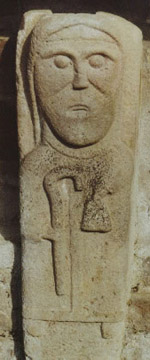 They made a rule in Scete that they would fast a whole week before celebrating Easter. But it happened that in the week some brethren came to Abbot Moses, from Egypt, and he cooked them a little vegetable stew. And when they saw the smoke coming up from his cell, the clerics of the church that is in Scete exclaimed: Look, there is Moses breaking the rule, and cooking food in his cell. When he comes up here we’ll tell him a thing or two. But when the Sabbath came, the clerics saw the great holiness of Abbot Moses, and they said to him: O Abbot Moses, you have broken the commandment of men, but have strongly bound the commandment of God.
They made a rule in Scete that they would fast a whole week before celebrating Easter. But it happened that in the week some brethren came to Abbot Moses, from Egypt, and he cooked them a little vegetable stew. And when they saw the smoke coming up from his cell, the clerics of the church that is in Scete exclaimed: Look, there is Moses breaking the rule, and cooking food in his cell. When he comes up here we’ll tell him a thing or two. But when the Sabbath came, the clerics saw the great holiness of Abbot Moses, and they said to him: O Abbot Moses, you have broken the commandment of men, but have strongly bound the commandment of God. Archaeologists tell us that the people of Israel were not alone in using ashes in rituals of purification. Ashes appear in Phoenician burial art and Arabic expressions. Ashes were a sign of grief, mourning, humiliation and penitence. When Job loses everything, he sits among the ashes. Cursed and overrun by enemies, the Psalmist "eats ashes like bread, and mingles tears with drink." Ashes are what are left after destruction. After chaos or catastrophe, ashes are what remain.
Archaeologists tell us that the people of Israel were not alone in using ashes in rituals of purification. Ashes appear in Phoenician burial art and Arabic expressions. Ashes were a sign of grief, mourning, humiliation and penitence. When Job loses everything, he sits among the ashes. Cursed and overrun by enemies, the Psalmist "eats ashes like bread, and mingles tears with drink." Ashes are what are left after destruction. After chaos or catastrophe, ashes are what remain. 






4 Comments:
At 3/31/2006 11:25 PM, Anonymous said…
Anonymous said…
I was with them until they invoked the hurricanes, and then I lost what little respect I had for them. Hurricanes do not choose where they hit on the basis of race, and I don't think the inadequacies of the disaster response had anything to do with race. It was just a matter of inadequate preparation, imcomplete communication, bureaucratic incompetence, and overwhelming catastrophe. In fact, the poor, "minority" neighborhoods got much more media coverage than the "nonminority" areas did regardless of poverty. I saw more racism in the media coverage than in anything else.
My father has gone to on hurricane relief trips several times and the one thing he has said is consistent among all the disasters he has worked is that disaster makes stupid differences like the shade of ones skin disappear. Everyone is in this together. I hate to see the Episcopal Church grovel in false humility because they are jumping on the racism bandwagon. "Oh look how pious we are, we're apologizing for racism." If we truly want to rid ourselves or racism, our behavior will change to treat all people equally regardless of the darkness or lightness of their skin. And while I refuse to treat anyone differently because of the color of their skin, I refuse to apologize for the color of my own.
At 3/22/2010 2:15 AM, Anonymous said…
Anonymous said…
One “Poor White Peoples” Response
(Or, This Honky's Turn To Talk)
I don’t want your sympathy.
I don’t want your sarcasm.
I just want simple human respect.
I’m not responsible for slavery.
I’m not responsible for Jim Crow.
My mother wasn’t even born yet.
I never kept you out.
I never took your seat.
I can barely remember segregation.
I don’t deserve your anger.
I don’t deserve your hate.
I certainly don’t treat you like that.
I’m not out to get you.
I’m not out to hurt you.
So, don’t stereo type me with that.
I see you as a person.
I see you as God’s own.
What more can one expect?
I don’t want your sympathy.
I don’t want your sarcasm.
I just want your respect.
@ copyright April 2001, by T. M. M.
At 10/18/2014 5:24 AM, loans for people with bad credit said…
loans for people with bad credit said…
During the loans for bad credit submission of an application for a no credit check financial loans, borrowers have two options. You can for a short 14-day loans, with full repayment is expected by her next paycheck login. If unable to meet this day, the borrower can apply for an extension bad credit loans and select a 30-day Glen personal loan this article goes in depth about the benefits and types of car title loans Glen Valley.
At 10/21/2014 12:40 AM, shainw79 said…
shainw79 said…
Time period must be long enough for you to pay it back, without the EMIS a lot of pressure on the bags. However, you may be spending too long at the same time, a concept, auto loan, the interest in a lot of money. You should be good, and you should be able to be to pay it on the last date that is comfortable for you back.
http://6monthtextloansnoguarantor.co.uk
http://uk6monthloans.co.uk/
http://www.elongtermpaydayloansuk.co.uk/12-month-loans.html
Post a Comment
<< Home